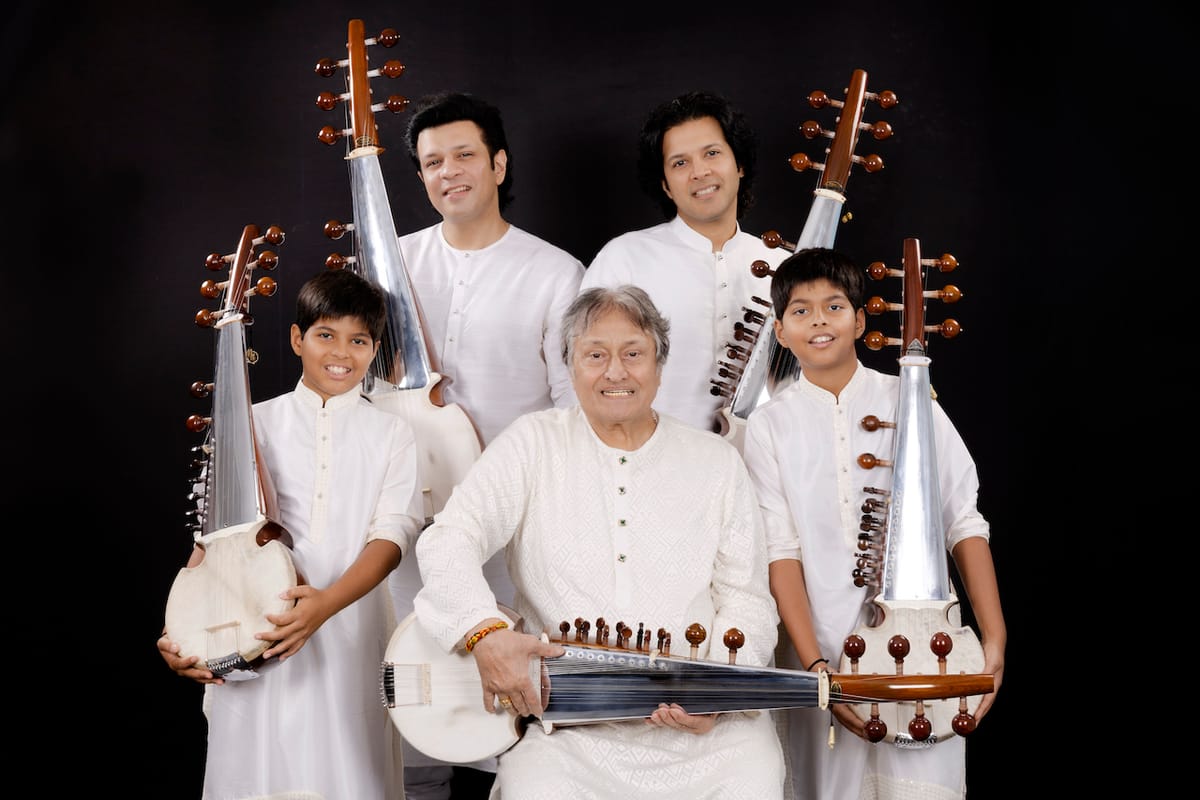Three Generations, One Melody: The Sarod Quintet at Aadi Anant Festival
The Citi NCPA Aadi Anant festival celebrates the guru-shishya tradition with a Sarod Quintet concert featuring Amjad Ali Khan, his sons, and grandsons—a legacy of Indian classical music spanning three generations.

Whether through direct discipleship, an inherited legacy or learning by osmosis when sharing the stage with a senior musician, the guru-shishya tradition, so elemental to Indian classical music, has been the central focus of the Citi NCPA Aadi Anant festival, which also continues to be a thriving platform for innovation within tradition.
Since its launch in 2012, the Citi NCPA Aadi Anant festival has been a much-awaited event on Mumbai’s cultural calendar. Each year, it is curated to give the audience the opportunity to experience India’s musical richness while celebrating the guru-shishya tradition and creative rejuvenation of tradition.
Now in its 14th edition, the Mumbai leg of the festival, which the NCPA has also taken to Delhi, Chennai, Bengaluru, Hyderabad, Ahmedabad and Pune, will be held on 7th and 8th December.
A special concert, titled Sarod Quintet: Three generations, One nation, will feature sarod maestro Amjad Ali Khan, his sons Amaan Ali Bangash and Ayaan Ali Bangash and grandsons Abeer Ali and Zohaan Ali. The concert at the Jamshed Bhabha Theatre will showcase an artistic legacy which has been carried from one generation to the next in an unbroken manner.
The legendary maestro is naturally proud. “Any legacy is only continued with the blessings of Almighty God. In today’s times, it is a pleasant surprise that even my grandchildren are playing the sarod. In our country, many young people want to be westernised. But it is also important to stick to our tradition,” he says.
Amjad Ali Khan says Ayaan started teaching his sons to play the sarod during the lockdown. “They have all the interests that children of their age have. They like Michael Jackson, Justin Bieber and BTS. They love football too. One of them is a fan of Ronaldo, the other loves Messi. But when it comes to learning the sarod, they are serious students. They still have a long way to go, but the idea of having them onstage along with me and my sons Amaan and Ayaan is to give them confidence and seek the blessings of music lovers,” he elaborates.
Born in Gwalior on 9th October 1945, Amjad Ali Khan inherited an illustrious family legacy of sarod playing and learnt from his father, the great Hafiz Ali Khan. He represents the Seniya Beenkar gharana, which bears the hallmark of the tradition of instrumental music from Tansen and his disciples. The maestro says, “Our tradition believes in surrendering to Almighty God and surrendering to our guru. Like many musicians, I wanted my sons to learn music. I didn’t force them, but music grew on them because of their surroundings, and they were interested in learning the sarod.” He adds that his father used to say that one can master only one thing in one’s lifetime. “So when they completed school, I advised them to focus totally on the sarod, if that’s what they wanted to do,” he recalls.
Khan says he has taught both Amaan and Ayaan to think of every concert as a new one. “If we start saying today’s concert was great [and become complacent], what will happen tomorrow? I also tell them music has no religion. It is like flowers, water, colour, air, fragrance. Our family thus feels we belong to every religion. These are values that should be imbibed by my grandsons too,” he says.
As a five-member ensemble, the musicians played together first in Delhi and then in New York last year. The Sarod Quintet concert in December will begin with a recital by Amaan and Ayaan. This will be followed by a performance by the maestro himself. In the grand finale, Abeer and Zohaan will join in, thus showcasing five members from three generations of sarod players— the spirit of guru-shishya parampara epitomised in the true sense.
By Narendra Kusnur. This piece was originally published by the National Centre for the Performing Arts, Mumbai, in the December 2024 issue of ON Stage – their monthly arts magazine.





